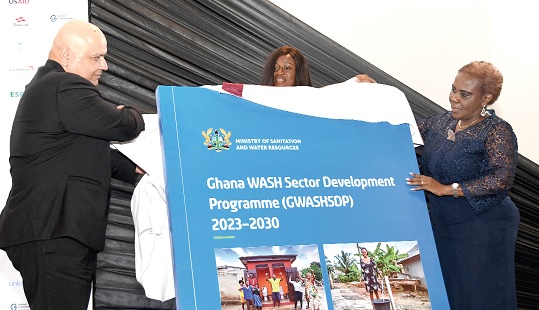
$1.7 Billion required annually to meet WASH target by 2030
The country needs $1.7 billion annually to provide adequate water, sanitation and hygiene (WASH) services to unserved populations by 2030.
The fund could be mobilised through bilateral partnerships, access to commercial capital and leveraging private sector capital.
The Global Director of Water Practice of the World Bank Group, Saroj Kumar Jha, who was speaking at the launch of the Ghana water, sanitation and hygiene sector development programme (GWASHSDP) in Accra yesterday, said in an era of limited resources, to achieve the $160 billion required globally to meet water and sanitation targets under the SDGs by 2030, the nation needed to prioritise "thoughtful financial strategies that look at more sustainable funding sources".
He, therefore, called for stronger collaboration between the Ministries of Sanitation and Water Resources and Finance, as well as the National Development Planning Commission (NDPC) to raise funds for WASH projects.
Mr Jha commended Ghana for successfully implementing the Greater Accra Metropolitan Area Sanitation and Water Project (GAMA-SWP).
About programme
The programme is a 10-year initiative (2021-2030) aimed at achieving universal basic WASH services by 2030 in line with SDG Six.
It provides a framework for inclusive sector planning, implementation, monitoring, evaluation and reporting for sustainable WASH services.
The document for implementing the programme is merged with the national environmental strategic and water sector plans which reflects on current development needs in line with the SDGs.
Again, it provides an overview of the country’s WASH status — key actors and their respective roles and responsibilities, policy institutional and legal framework, as well as key challenges affecting the sector's performance.
The document also points out challenges in the WASH sector such as weak planning and coordination, inequalities in resource allocation, weak monitoring information system and the lack of integrated planning between water resource management and WASH.
It has six key components — water resource management and water supply; environmental sanitation — covering liquid and solid waste and hygiene; WASH in institutions; institutional development and sector strengthening; management and organisation of the programme and the cost of implementing the programme.
The document will further serve as a guide for the preparation of a WASH sector budget, mobilisation of resources and the implementation of future projects.
Achievements
The Minister of Sanitation and Water Resources, Cecilia Abena Dapaah, said the country had made significant strides in the sector.
“Currently, population with access to basic drinking water services has increased from 79 per cent in 2017-2018 to 87.7 per cent in 2021.
“Population with access to improved toilet facilities, including public toilets, has also increased from 66 per cent to 80.8 per cent within the same period,” she said.
Ms Dapaah added that the government had invested $1.4 billion in water and sanitation projects nationwide, some of which had been completed.
She said about 5.3 million people were expected to benefit from those interventions.
Way forward
The minister said the goal of the government was to accelerate and enhance access to equitable WASH services across the country, using a multi-faceted approach.
“We are emphasising governance and sector institutional strengthening to improve service delivery and increase the sustainability of WASH programmes,” she added.
